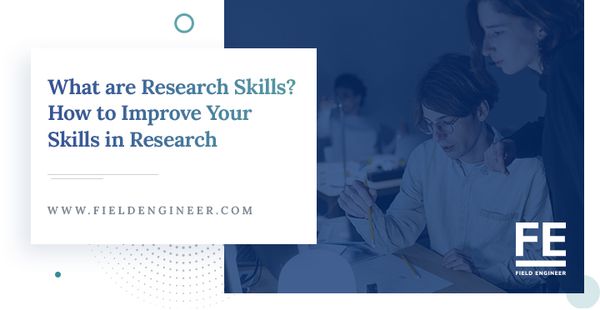What are Research Skills? How to Improve Your Skills in Research
Learn strategies and techniques to improve your research skills. Avoid common mistakes and implement proven methods for efficient research. This article offers practical tips to enhance your ability to find and evaluate high-quality information.
Are you struggling to find relevant and reliable information for your research? Do you want to avoid getting lost in a sea of sources and needing help knowing where to start? Improving your research skills is essential for academic success and professional growth.
In today's information age, effectively conducting research has become more important than ever. Whether you are a student, a professional, or simply someone who wants to stay informed, knowing how to find and evaluate information is crucial.
Fortunately, some strategies and techniques can help you improve your research skills and become a more efficient and effective researcher. By avoiding common mistakes and implementing proven methods, you can enhance your ability to find high-quality information and make the most of your research endeavors. This article will explore some practical tips and tricks to help you improve your research skills and achieve better results.
What is Research?
Research is a critical part of learning, problem-solving, and decision-making. It is an essential process used in every field for both the individual and collective’s mutual benefit and success. Research involves systematically gathering data from primary or secondary sources, analyzing it, interpreting it, and communicating its findings to researchers and other interested parties.
Research can be divided into two main categories: quantitative research, which uses numerical data to describe phenomena, and qualitative research, which seeks to understand people's beliefs, opinions, values, or behaviors. Quantitative research often involves applying model-based approaches that can predict outcomes based on observations. It is one of the most powerful methods of discovering information about the world, as it allows for testing hypotheses in a systematic manner. Qualitative research is more exploratory in nature by focusing on understanding the motivations behind what people do or think rather than developing models or producing statistics in order to conclude behavior and relationships between variables. This type of research usually relies more on observation and engagement with people instead of using statistical models.
What are Research Skills?
Research skills are the abilities and talents required to focus on an objective, gather the relevant data linked to it, analyze it using appropriate methods, and accurately communicate the results. Taking part in research indicates that you have acquired knowledge of your subject matter, have digested that knowledge, and processed, evaluated, and analyzed it until you can resolve a problem or answer a query. It is highly beneficial for employers to hire people with strong research skills since they can provide valuable insights and add value to the company’s performance. Therefore, researching effectively has become crucial to securing a job in most industries.
Why Do Research Skills Matter?
Research skills are essential if one intends to succeed in today's competitive world. With technology ever-evolving and a need to stay ahead of the competition, employees who possess research skills can prove invaluable to their employers. These skills include researching, analyzing, and interpreting data and making informed decisions based on that information.
Employers value workers who can quickly develop a thorough understanding of any changes or trends in their field of work through accurate research. Knowing how to assess customer needs, recognize competition, write reports, improve productivity, and advise on investments can also benefit any business. With the help of research skills, companies can uncover ways to adapt their services or products that better serve their customers’ needs while helping them save money at the same time. This makes overall operations more efficient as well as helps a company remain ahead of its competitors.
Essential Research Skills :
Here is a list of essential research skills:
Data Collection
Data collection is an important part of comprehending a certain topic and ensuring reliable information is collected while striving to answer complex questions. Every situation differs, but data collection typically includes surveys, interviews, observations, and existing document reviews. The data collected can be quantitative or qualitative, depending on the nature of the problem at hand. As students advance through university and other educational institutions, they will need to read extensively into a particular field and may even need to undertake comprehensive literature reviews to answer fundamental questions.
The skills acquired through data collection during university are invaluable for future roles and jobs. Gaining experience in understanding complex topics, reading widely on a given subject matter, collecting relevant data, and analyzing findings - all these activities are integral when dealing with any type of project within the corporate sector. Therefore, embarking on various research projects enhances a person's education level and brings about significant professional experience.
Goal-Setting
Setting goals is an important skill for any successful research project. It allows you to stay focused and motivated throughout the process. Goals are also essential in helping with direction: they provide a path to organize our thoughts, narrow our focus, and prioritize the tasks we need to undertake to achieve our desired result. The concept of goal-setting is inherent in most research processes, as everything needs to have something to strive for — whether that’s gaining knowledge about a particular topic or testing a theory.
When it comes to creating and setting goals during the research process, you must have clear and specific objectives in mind from the outset. Writing down your thoughts helps define these objectives, which can inform the data collection process; moreover, thinking about short-term and long-term goals can help you create manageable steps toward achieving them. Learning how to break up larger projects into smaller “mini-goals effectively” can make all the difference when tackling complex investigations — allowing researchers to monitor their progress more easily and culminate results further down the line.
Critical Thinking
Critical thinking is an integral part of the modern workplace. To succeed, one must be able to look at a situation objectively and make decisions based on evidence. The information examined needs to come from various sources, such as data collection, personal observation, or analysis. The goal should then be to take all this information and form a logical judgment that informs an action plan or idea.
Someone who displays strong critical thinking skills will not just accept proposed ideas at face value but instead can understand how these ideas can be applied and challenged. Accepting something without consideration means making the wrong decision due to a lack of thought. Critical thinkers understand how brainstorming works, assessing all elements before forming any decision. From negotiating with colleagues or customers in adversarial scenarios to analyzing complex documents such as legal contracts in order to review business agreements - critical dedicated apply their knowledge effectively and are able to back up their evaluation with evidence collected from multiple sources.
Observation Skills
Observation skills are necessary for conducting any form of research, whether it be in the workplace or as part of an investigative process. It is important to be able to pick up on the details that might otherwise pass unnoticed, such as inconsistencies in data or irregularities in how something is presented, and to pay careful attention to regulations and procedures that govern the company or environment. This can help researchers to ensure their processes are accurate and reliable.
As well as analyzing what we see around us directly, many research methodologies often involve calculated statistical analyses and calculations. For this reason, it’s important to develop strong observation skills so that the legitimacy of information can be confirmed and checked before conclusions are formed. Improving this skill requires dedication and practice, which could include keeping a journal reflecting on experiences, posing yourself questions about what you have observed, and seeking out opportunities in unfamiliar settings to test your observations.
Detail Orientation
Detail orientation is an important research skill for any scientific endeavor. It allows one to assess a situation or problem in minute detail and make appropriate judgments based on the information gathered. A detail-oriented thinker can easily spot errors, inconsistencies, and vital pieces of evidence, which can help lead to accurate conclusions from the research. Additionally, this skill allows someone to evaluate the quality and accuracy of data recorded during an experiment or project more efficiently to ensure validity.
Spotting small mistakes that may otherwise have been overlooked is a crucial part of conducting detailed research that must be perfected. Individuals aiming for superior outcomes should strive to develop their skill at detecting details by practicing critical analysis techniques, such as breaking down large bodies of information into smaller tasks to identify finer points quickly. Moreover, encouragement should also be made for elaborate comparison and analysis between different pieces of information when solving a complex problem, as it can help provide better insights into problems accurately.
Investigative Skills
Investigative skills are an essential component when it comes to gathering and analyzing data. In a professional setting, it is important to determine the accuracy and validity of different sources of information before making any decisions or articulating ideas. Generally, effective investigation requires collecting different sets of reliable data, such as surveys and interviews with stakeholders, employees, customers, etc. For example, if a company internally assesses possible challenges within its business operations environment, it would need to conduct more profound research involving talking to relevant stakeholders who could provide critical perspectives about the situation.
Data-gathering techniques such as comparison shopping and regulatory reviews have become more commonplace in the industry as people strive for greater transparency and more accurate results. Knowing how to identify reliable sources of information can give individuals a competitive advantage and allow them to make sound decisions based on accurate data. Investing time in learning different investigative skills can help recruiters spot applicants dedicated to acquiring knowledge in this field. Developing these investigative skills is also valuable for those looking for executive positions or starting their own business. By familiarizing themselves with their application process, people can become adept at collecting high-quality data they may use in their research endeavors.
Time Management
Time management is a key skill for any researcher. It's essential to be able to allocate time between different activities so you can effectively plan and structure your research projects. Without good time management, you may find yourself hastily completing tasks or feeling stressed out as you rush to complete an analysis. Ultimately, managing your time allows you to stay productive and ensure that each project is completed with the highest results.
Good time management requires various skills such as planning ahead, prioritizing tasks, breaking down large projects into smaller steps, and even delegating some activities when possible. It also means setting realistic goals for yourself in terms of the amount of research that can be achieved in certain timestamps and learning how to adjust these goals when needed. Becoming mindful of how you spend the same hours each day will propel your productivity and see positive results from your efforts. Time management becomes especially relevant regarding data collection and analysis – it is crucial to understand precisely what kind of resources are needed for each task before diving into the research itself. Knowing how much time should be dedicated to each step is essential for meeting deadlines while still retaining accuracy in the final outcomes of one’s study.
Tips on How to Improve Your Research Skills
Below are some tips that can help in improving your skills in research:
Initiate your project with a structured outline
When embarking on any research project, creating an outline and scope document must first ensure that you remain on the right track. An outline sets expectations for your project by forming a detailed strategy for researching the topic and gathering the necessary data to conclude. It will help you stay organized and break down large projects into more manageable parts. This can help prevent procrastination as each part of the project has its own timeline, making it easier to prioritize tasks accordingly.
Using an outline and scope document also allows for better structure when conducting research or interviews, as it guides which sources are most relevant, what questions need to be answered, and how information should be collected or presented. This ensures that all information received through research or interviews stays within the confines of the chosen topic of investigation. Additionally, it ensures that no important details are overlooked while minimizing the chance that extraneous information gets included in your results. Taking this time upfront prevents potential problems during analysis or reporting of findings later.
Acquire expertise in advanced data collection methods
When it comes to collecting data for research purposes, a range of advanced data collection techniques can be used to maximize your efficiency and accuracy. One such technique is customizing your online search results with advanced search settings. By adding quotation marks and wildcard characters to the terms you are searching for, you are more likely to find the information you need from reliable sources. This can be especially useful if, for instance, you are looking for exact quotes or phrases. Different search engines require different advanced techniques and tactics, so learning these can help you get more specific results from your research endeavors.
Aside from using online searches, another standard methodology when conducting research is accessing primary information through libraries or other public sources. A specific classification system will likely be in place that can help researchers locate the materials needed quickly and easily. Knowing and understanding this system allows one to access information much more efficiently while also giving them ample opportunity to increase their knowledge of various topics by browsing related content in the same category groups. Thus, by learning about advanced data collection techniques for both online and offline sources, researchers can make substantial progress in their studies more efficiently.
Validate and examine the reliability of your data sources
Collecting reliable information for research can be a challenge, especially when relying on online sources. It is essential to remember that not all sources are created equal, and some sites may contain false or inaccurate data. It is, therefore important to verify and analyze the data before using it as part of your research.
One way to start verifying and analyzing your sources is to cross-reference material from one source with another. This may help you determine if particular facts or claims are accurate and, therefore, more valid than others. Additionally, trace where the data is coming from by looking at the author or organization behind it so that you can assess their expertise in a particular field and authority on the topic at hand. Once these steps have been completed, you can confidently use this trusted information for your project.
Structure your research materials
Organizing your research materials is an integral part of any research process. When you’re conducting a project or study and trying to find the most relevant information, you can become overwhelmed with all the data available. It’s important to separate valid from invalid materials and to categorize research materials by subject for easy access later on. Bookmarking websites on a computer or using a digital asset management tool are two effective methods for organizing research information.
When researching, it’s critical to remember that some sources have limited value and may be outside the scope of your topic. Recognizing reliable material versus trustworthy resources can be complex in this sea of information. However, sorting data into appropriate categories can help narrow down what is necessary for producing valid conclusions. This method of classifying information helps ensure that vital documents aren't overlooked during the organization process as they are placed in folders shortcutted for quick access within one centralized source whenever needed. Separating valuable sources also makes it easier to reference later on when writing reports or giving presentations - material won't get lost among irrelevant data, and conclusions will be backed by sound evidence.
Enhance your research and communication capabilities
Developing research and communication skills is essential for succeeding academically and professionally in the modern world. The key to improving these skills lies in rigorous practice, which can begin with small projects such as resolving common issues or completing a research task that can be made into a personal project. One way to do this is to volunteer for research projects at work and gain experience under the guidance of experienced researchers. This will improve your research skills and help you develop communication skills when working with others on the project. Another option is to turn a personal project into a research task. For example, if you plan on taking a holiday soon, you could create an objective method to select the best destination by conducting online research on destinations and making informed decisions based on thorough analysis. Practicing in this way enables you to complete any research task confidently and communicate efficiently with ease.
How to Articulate Research Skills on Your Resume
Research projects require commitment and perseverance, making it an important skill to include on a resume. Even if you have had limited research experience throughout your education or previous job, including this in your resume assesses these qualities to potential employers. It's important to consider the extent of your research experience when deciding how to add this part of your background to your resume. If you have been involved with multiple in-depth research projects, it might be best to highlight this by including it as its own section. On the other hand, if the amount of research you have completed is more limited, then try including it in the skills section instead.
When adding research experience and accomplishments into either section of your resume, be sure to emphasize any specific roles or contributions you made during the process instead of just describing the project itself. Furthermore, remember to quantify any successes where possible - this showcases both communication and technical proficiency strengths, which can help make your resume stand out even more. By properly articulating research skills within a resume, employers will likely be more interested in what job seekers have accomplished in their careers.
How to Apply Research Skills Effectively in Your Workplace
Research skills are an invaluable set of abilities to bring to your workplace. To make sure you use them properly, a good place to start is by taking time to plan the project you have been assigned. Whether it’s writing a report or analyzing data, mapping out what tasks you need to do and how long they should take helps to understand the project timeline better. This also makes setting aside dedicated time for research easier too.
To ensure that the decisions made are sound and informed, reading up on the subject area related to the project remains one of the premier ways of doing this. This will help to ensure that any problems arising can be solved quickly and effectively, as well as provide answers before any decisions are actually put into practice. By arming yourself with knowledge gathered through reading about a particular topic, it can give you more confidence when formulating plans or strategies in which direction to take your work in.
Final Thoughts
Research skills are increasingly important in the modern world, and gaining proficiency in this area can significantly benefit a person's career. Research skills are essential for success in many different roles and fields, including those within business and industry, education, science, and medicine. Developing a deep understanding of research allows us to identify problems better and critically evaluate potential solutions. It also bolsters our problem-solving abilities as we work to find creative solutions that meet our efforts' objectives.
By improving your research capabilities, you can impress employers during an application process or when joining a team at work. Research skills are considered soft skills by potential employers since they signal that you have attention to detail while simultaneously demonstrating your ability to learn new things quickly. Employers regard these skills highly, making them one of the key graduate career skills recruiters seek. Furthermore, being able to add ‘research skills’ to your CV will be looked upon favorably by employers and help drive up your employability significantly. Demonstrating that you possess these sought-after traits makes it easier for recruiters to give you the opportunity you've been looking for, so it's worth investing the time into developing these life-long learning tools today.








